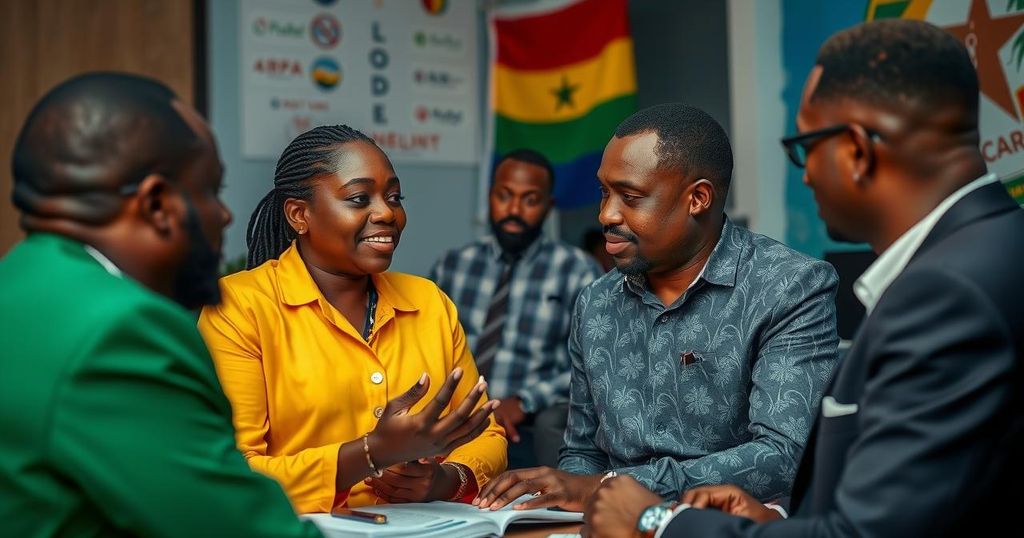As Ghana approaches its elections, economic issues dominate voter concerns. Vice President Bawumia and former President Mahama are the leading candidates, focusing on job creation and economic recovery strategies. Voter dissatisfaction is palpable, particularly regarding unfulfilled promises of development. The electoral commission faces scrutiny, yet has committed to transparency and peace during the election process. Both candidates signed a peace pact to uphold the integrity of the electoral outcome, ensuring a democratic transition amid public unrest.
As Ghana approaches its presidential elections, more than 18 million eligible voters are preparing to cast their ballots on Saturday. The election features eleven candidates; however, the prominent contest is between Vice President Mahamudu Bawumia of the ruling New Patriotic Party (NPP) and John Dramani Mahama of the National Democratic Congress (NDC), who previously served as president from 2013 to 2017. This marks Mahama’s third attempt at the presidency, having lost to outgoing President Nana Akufo-Addo in the past two elections. Bawumia aims to retain the ruling party’s dominance, further complicating the political landscape.
The electoral commission has faced criticism regarding transparency, yet its chairperson, Jean Mensa, has assured that the elections will be conducted peacefully and credibly. “As a commission, I assure you that we would continue to apply these ingredients of transparency, responsiveness and inclusiveness in all our activities through to the election day and beyond,” Mensa stated. All 275 parliamentary seats are also contested, with voting scheduled at over 40,000 polling centers nationwide from 6 a.m. to 5 p.m. local time. A candidate must receive at least 50% plus one vote to win outright, or a runoff will follow.
A sentiment of disappointment prevails among Ghanaians, particularly regarding unfulfilled developmental promises. Voters like Abdullai Jamal expressed frustration over the lack of infrastructure in their communities, stating, “We just vote. They keep connecting other communities with electricity, leaving us out.” This sentiment is echoed by others who are contemplating a boycott due to inadequate public services. Experts warn that politicians must adequately address voter concerns and avoid complacency, emphasizing that citizens hold the power to shape electoral outcomes based on fulfilled promises.
Both leading candidates, Bawumia and Mahama, emphasize economic recovery as a focal point of their campaigns, given its critical role in the current election cycle. Ghana is currently working under an International Monetary Fund program to stabilize its economy, burdened by significant debt of approximately $30 billion. Bawumia advocates for digital innovation to create job opportunities, pledging to equip one million youths with digital skills. In contrast, Mahama has proposed a comprehensive 24-hour economic policy aimed at enhancing job creation, questioning the credibility of Bawumia’s claims about job growth.
In a bid for a peaceful electoral process, both candidates have signed a peace pact to accept the election results, aiming to foster an environment conducive to fair elections. Mahama has committed to sustaining peace, while Bawumia has indicated hope for the nation’s strength post-election. Observers anticipate a peaceful election, largely due to the candidates’ mutual commitment to uphold democratic principles despite the underlying tensions.
The upcoming presidential elections in Ghana reflect a critical juncture in the country’s political landscape, influenced by economic challenges and public discontent. With over 18 million voters eligible to participate, the stakes are high for both the ruling party and the opposition. The main candidates, Vice President Mahamudu Bawumia and former President John Dramani Mahama, represent contrasting approaches to governance amid mounting calls for transparency and accountability. Their campaigns are centered on economic recovery strategies, addressing the electorate’s expectations for concrete development, especially in regions feeling neglected. The recent controversies surrounding the electoral commission’s transparency further underscore the urgency for credible and peaceful elections in Ghana.
In conclusion, Ghana’s upcoming presidential elections are poised to address pressing economic challenges and voter dissatisfaction. With Bawumia and Mahama at the forefront of the electoral battle, their differing strategies highlight the importance of job creation and infrastructural development. The commitment to a peaceful election process is evident through the signing of a peace pact, fostering hopes for a harmonious democratic transition. As voters prepare to make their voices heard, the integrity and transparency of the electoral commission remain crucial for enhancing public confidence in the democratic process.
Original Source: www.dw.com







